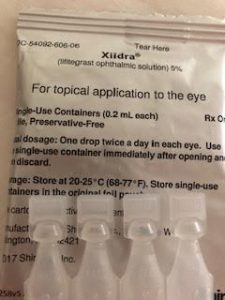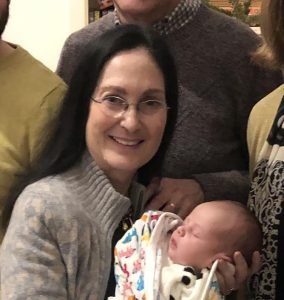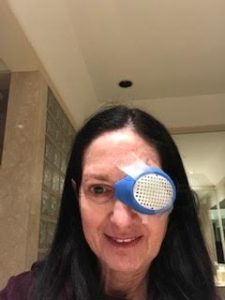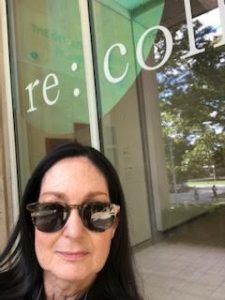
June, 1964
I began wearing glasses at the age of 8. I couldn’t read the board clearly and knew something was amiss. I had become near-sighted. But my beloved teacher, Mrs. Zeve, wore glasses and she made it seem OK. I got pink, metal frames that weren’t too ugly. My second teeth; big and crooked, came in too and I felt like I looked like a freak. Kids mocked me. Those glass frames broke and the next ones weren’t as nice. The “cat’s eye”, pointed frames were fashionable. It wasn’t a great look for a little girl. I don’t think I carried it well. Also, it seems that my brain needs to see things crisply. As my vision would worsen, I’d get headaches, the beginning of a lifetime of dealing with migraines.
Soon after, I remember getting my first “floater”, clumps in the vitreous (liquid) inside the eye, casting shadows on the retina. I asked the next-door neighbor boy to take a look and see if he saw anything in my eye (of course he couldn’t). I was very young for something like this. Usually these come with age, and indeed, they have increased. My left eye has some that are so large they almost entirely obscure my vision from time to time. And sometimes, I see little black dots and think there are bugs flying by and swat at them. Not helpful!
In 6th grade, that awful year when we moved from Detroit to Huntington Woods, my mother had a mental breakdown and the girls were so awful to me, one memory around those glasses sticks in my brain like a raw wound. I sat in the front row of desks. One morning, a boy who sat a few desks down from me, walked in, stood in front of me, held my chin in his hand, tilting my head this way and that. I thought he admired me. Then he took his comb out of his back pocket and combed his hair in the reflection of my glasses! That one hurts to this day. Of course he became a therapist.
I am 11 years old in the above Featured photo. It is my first day at the National Music Camp in June, 1964 (months after the above incident). My cabin hadn’t gotten our corduroy knickers yet (camp-issued uniforms). My parents found my brother and me in Main Camp (it was unusual for the little girls to be in Main Camp) and snapped this photo. It was also rare for me to be photographed wearing my glasses. Even at that age, I always took them off for pictures. I couldn’t wait to get contact lenses.
I got my first pair of contact lenses at the beginning of 9th grade. Those were original, hard lenses. We sat in the optometrist’s office every day for a few weeks as we built up wearing time and learned proper care for the lenses. I was a quick study and wore them very well. You could usually spot a lens wearer. She would blink a lot and maybe squint. I had no such problems and wore mine very successfully for years. At some point, my father bought me a second pair and dropped the insurance on them (they were expensive). I never lost a contact lens.
Sometime in the early 1980s (after wearing my original pair 15 years or so), I noticed my eyes were a bit blurry. I was standing on a Metro platform in Washington, DC with two colleagues. One also wore contact lenses and told me he’d had the same problem. He gave me the name of his ophthalmologist, whose office happened to be a few blocks from my home. I made an appointment and he identified the problem immediately. My original hard lenses didn’t let oxygen get to my corneas, causing the blurry damage. He prescribed gas-permeable lenses and everything cleared up. I stayed with this wonderful man through several office moves (he wound up as Head of General Eye Services at Mass Eye and Ear) until his retirement, many years ago. He was SO helpful.
Unfortunately, in January, 1990, I developed severe dry-eye. I produce only 20% of normal tear flow. My father died early that month, I was nursing a baby and it was winter; I thought it was a temporary phenomenon and would pass, but it didn’t. I couldn’t comfortably float my contact lenses on my eyes. About that month, Vicki later observed that I’d used up all my tears crying for my father.
I discussed this with my doctor. He suggested I try soft lenses. They have a high water content and could be more comfortable, but I probably wouldn’t get as good a correction. I was willing to try anything. I moved to those lenses and they were fine for a while, but even those became uncomfortable, so I’d save my wearing time for special occasions – if we went out in the evenings; times like that. Also, by the time I was 38, I found I needed to wear reading glasses over my contact lenses. I felt I was very young for that. I got graduated bifocals in my regular glasses. My eyes were rapidly deteriorating.
I tried plugs in my tear ducts to retain the tears on my eyes, but they didn’t work. I cauterized the lower tear ducts shut. I’m not sure it made any difference. I had to give up the contact lenses altogether. I’ve tried Restasis and even a new drug, Xiidra. Nothing worked. I appear to be allergic to Xiidra, as it caused tears to flow down my cheeks constantly (without bringing any relief to the chronic dry-eye).
I had followed the literature on photorefractive keratectomy (PRK) for some time. It was a way to correct severe (up to five diopters of myopia) by scraping and reshaping the cornea. It was legal in Canada, but not the US. It became legal here in 1995. After some discussion with my doctor, I moved forward with it (this was a precursor to LASIK, more involved and less comfortable). I did my right eye first on a Friday, had a painful weekend, but was fine by Monday. My vision was better, but not perfect. I moved on to the left eye. The doctor finally informed me that I ALSO had astigmatism. Who knew? No one had ever mentioned that to me, everyone was focused on the myopia. Correcting for the astigmatism was yet legal to do as part of the procedure. REALLY? So, though my vision was much better (though I had lost all my up-close vision and now needed strong reading glasses), I still needed to wear glasses. Sigh.
A year later, the procedure was approved for astigmatism. We went back and tried the left eye again, but got no improvement. There isn’t much remaining of my cornea to reshape. So I still need glasses. I’ve gone through all sorts of styles, but settled on a rimless pair because they are very lightweight (increasingly, anything pushing on my head can cause a migraine) and because it doesn’t obscure my face. But the type of correction that I need does cause my eyes to look a bit askew.
Increasingly, I have difficulty seeing at night and I find the other car lights blinding. I had my doctor check for cataracts each visit. I had the beginnings of them, but nothing serious. Yet, about five years ago, I had an evening incident that really frightened me, while driving on unfamiliar streets. My GPS gave me directions that I couldn’t follow, I couldn’t read the street signs, I got horribly lost and it took me a long time to get home, after dropping off a friend in Cambridge. I begged the doctor to do the surgery, which he did. Since we were traveling, and I had a chorus concert, I did the eyes a few months apart. He had cautioned me that I might not get perfect results because of the PRK surgery, which had tampered with my cornea. Indeed, though I can pass a driver’s test without correction, I would never drive without glasses, so still wear them almost all the time. I see well at a middle distance (eating a meal, talking to a friend at close range), but distance remains a problem, and of course, reading.
Since we spend so much time on the beach, and my eyes are quite sensitive to light, of course, I have prescription sunglasses too. Glare off snow is a problem too. I wear sunglasses often.
With a history of glaucoma in the family, what will the next chapter hold? I turn 70 this year and check on my eyes regularly. Time will tell.
Retired from software sales long ago, two grown children. Theater major in college. Singer still, arts lover, involved in art museums locally (Greater Boston area). Originally from Detroit area.







Wow, Betsy, your eyes have not been kind to you over the years. Or, to put it another way, you have had to be very kind to them. I’d feel very fortunate if I’d been spared only half of what you have had to go through. But, as your clever title shows, you’ve been able to face it all with a healthy perspective (plays on words intended).
Here’s hoping that the next chapter is freer of eye woes. Some things do get better with age, right? Good luck!
Thanks, John. Friends often ask why I don’t read books much any longer (I do keep up with news, but that’s about it). Now you know why. The dry eye makes reading painful, my eyes go in and out of focus, get itchy, blurry…all very frustrating.
Betsy, sorry to hear of the bullying you endured when you were a “four-eyed” schoolgirl, kids can be so mean. And you’ve surely encountered your full share of other eye problems, procedures and surgeries.
But you’ve come through it all and look great in your rimless glasses – and Baby Rosa as always is adorable!
True, it wasn’t nice of that boy to tease me about my glasses, and I’ve had more than my share of eye troubles. Nevertheless, I persist!
I humbly agree. Baby Rosa is adorable. She was a newborn in that photo. We just visited her again last week. She’s a big 4 month old now, laughing, grasping at stuff, rolling from front to back, alert and wide-eyed. She liked it when I sang, “Rock-a my soul in the bosom of Abraham…so high, can’t get over it…” and so on, while we were trying to eat dinner. Anything to amuse her!
Like you, Betsy, I have had myopia all my life (starting with glasses at age 7). I am hoping to put up a story about it later this week. It was uncomfortable to read through all the ups and downs of your visual experiences–but that is a tribute to how well you wrote it, bringing the reader with you on this unpredictable roller-coaster. Happy to have you rolling along with me and hoping for no more sudden changes or disasters.
Thank you, fellow myopic. I, too, hope for no more disasters. I have some other weird thing that my doctor is following…the color part of my eye flecks off (it has a name, but I can’t remember what it’s called). It could be trouble, but isn’t so far. Sigh…never a dull moment with me. Hope everything is fine with you as well.
You have had such a rough go with your eyes, Betsy, but you are persevering. Interesting about the dry eye treatments because I was going to ask my ophthalmologist at my next appointment about options. My right eye tears uncontrollably and the left eye doesn’t, so I think my right tear duct is plugged. Aging eyes are no fun.
Very true, Mare. Good luck figuring out why that one eye is tearing all the time; also dealing with increasing dry eyes. No fun at all!
I am impressed with how you have persevered in the face of so many challenges, and hope your eyes don’t invent new problems for you. You have great pictures to illustrate and the featured one with the cat’s eye frames really caught the era. You weren’t the only one to mention being bullied over glasses—that is just so wrong. Maybe calling it out, even now, helps healing.
It’s funny Khati, I told a friend about this story a few weeks ago and she told me that she was literally called a “four-eyed freak” as a kid. So many of us were bullied for wearing glasses. But I guess we all got past it, one way or another. Now, most of us at least wear reading glasses, so age gets the better of us, one way or another.
I got my first pair of glasses at the same age as you! I wonder what there is about being eight?
Maybe that’s when grow out of babyhood (we start to get our second teeth at the age too), so our eyes start to change too?
Love the featured image of you in your glasses at NMC. I think you look really cute! As others have said, you have certainly had more than your share of eye problems. And oh Betsy, I know that I was the friend you dropped off in Cambridge five years ago, and I am so, so sorry that you went through that trauma because of me. (I do recall that you asked Dan to drive me to Cambridge, and he declined, so it’s only partially my fault . . . but still, I feel terrible about it!)
I wouldn’t call you out by name, Suzy. And yes, I asked my husband, but he doesn’t help me out with the driving in the dark stuff. It wasn’t your fault that I couldn’t see. But I did learn something. I try not to panic now, and just take my time and look very closely. I also have a newer car with a better GPS system. All of that helps a bit, but everything looks different in the dark. Not much to be done about it.
Quite a journey, Betsy. My husband has had many similar experiences as a wearer of hard contacts at a young age. I have to say, though, that you look beautiful in your wireless rims.
Thanks, Laurie. And nice to know that I have a compatriot in your husband.
Wow Betsy. Many similarities in our history although I have been fortunate not to have had all the issues you have had. First lenses: yep, hard, impermeable. I, too, had the myopia astigmatism combo. After my incident of losing a lens while traveling (my story) the subsequent change in the shape of my eyes severely compounded the astigmatism issue, but it could be corrected. I stopped wearing contacts when I was in my 30’s but climbed back on the wagon in my early 40’s; gas permeable this time. I did fine with them until I was about 48 and then discovered my eyes were just too dry to tolerate them further.
Yes, many similarities, Tom. But my dry eye, which occurred shortly after my 37th birthday, wrecked havoc with my contact lens wearing. I tried way too much other stuff which only partially worked, so now my vision is only so-so. Ah…so much fun! But nice to meet a kindred spirit.
Yes, my dry eye ended my use, too. In dramatic fashion. We had been on vacation on Block Island and on the ferry home my right eye really hurt. I tried to remove the lens and couldn’t. I put up with it until arriving home and then basically had to pry the lens of my eye. Not fun.
Wow, that sounds awful, Tom. Here’s one for you. My husband (yes, that guy who led me home when I popped my lens on campus in 1972) wore extended-wear lenses for a while – 2 weeks at a time. He took them out one morning (after the two-week period) and one eye just blew up with pain. He had an ulcer, festering for days, but the lens hid it; he didn’t know. Thank goodness, our doctor was just a few blocks away and he could walk over. I came home from work that night, he was sitting in a dark room with a big bandage over the eye. It took days to heal.
Betsy, you have developed quite an insight into corrective eye procedures over the years, and it looks like your perseverance has paid off for you. For me, it’s been hearing issues that began when I was a child, so I know how these ongoing health fights go. You have told your story well and reminded me how we’re both benefitting from improvements in medical science.
I would say that I have had some success with all my eye procedures, Jim. I cannot find relief for the dry eye, which does limit the amount of reading that I can do (no book clubs for me).
And now I can appreciate your hearing issues. I’ve had a form of tinnitus for several years now. Because it does not include an actual “ringing” sound, I didn’t recognize it as such until I saw an audiologist a few years ago, who confirmed the diagnosis and told me I need hearing aids, which I’ve worn for about 18 months (not all the time – mostly for TV viewing, or if I want to hear my husband, who tends not to look at me when he speaks to me, and he mumbles a lot, but even the hearing aids can’t fix that). So I feel for you!
Yes. Her insight is 20-20
I love your Feature Photo, June 1964 (several lifetimes ago, yet familiar). Your lifetime eye problems, chronicled here, itemizing almost every kind of eye problem I have ever heard of and some wholly new to me (that thing about bugs whizzing by your periphery is not wholly new to me), cause me to think, “She’s had a terrible time of it, yet, here she is, presenting the saga with good humor and equanimity, an efficient manager of a (series of) problems, and really time for be thankful for the good stuff in between the eye doctor visits.”
I guess I must be grateful that at least I can still SEE!